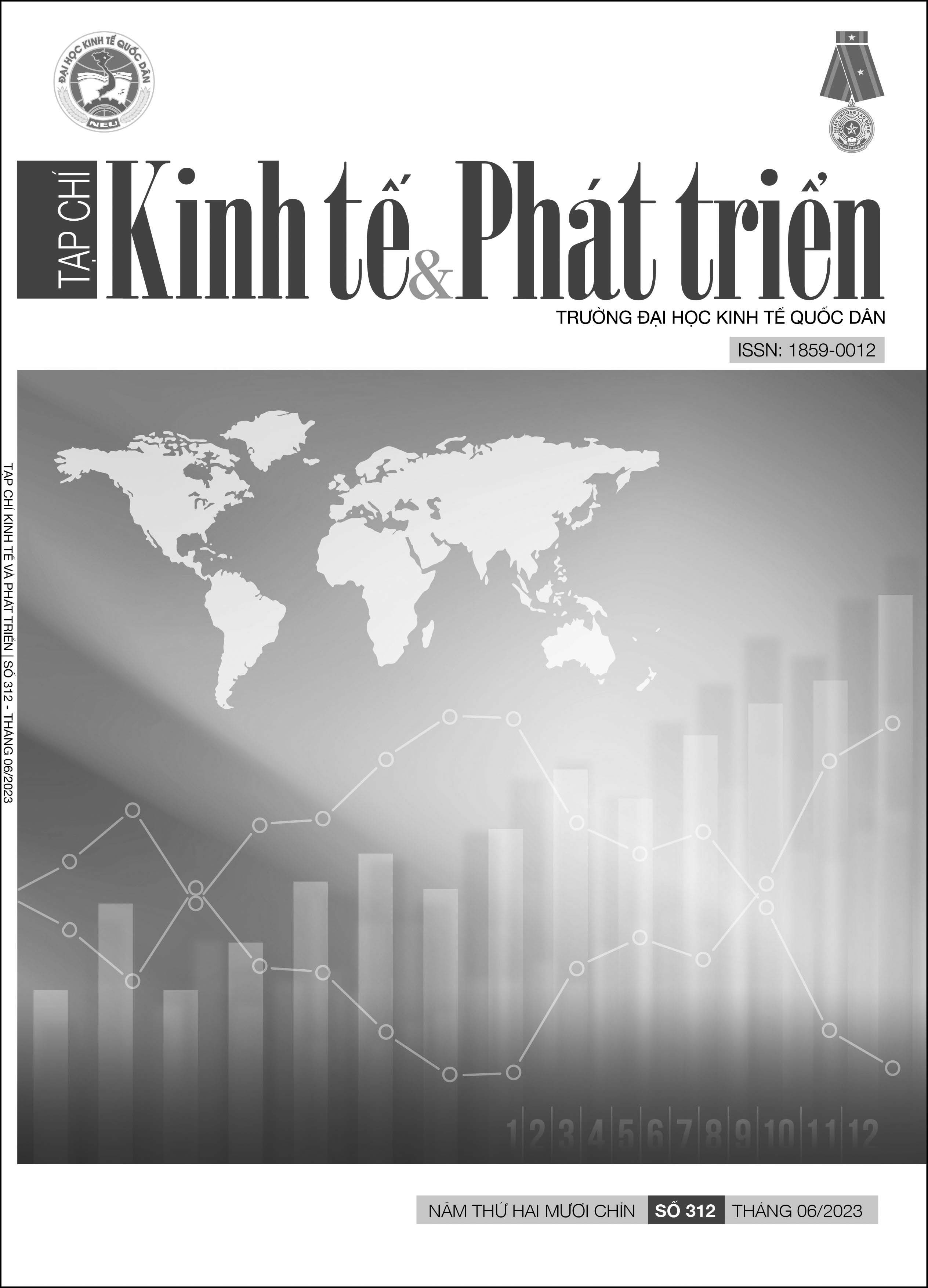Nghiên cứu ý định thực hiện hành vi vi phạm đạo đức nghề nghiệp của nhân viên kế toán
DOI:
https://doi.org/10.33301/JED.VI.1220Từ khóa:
Đạo đức nghề nghiệp, kế toán, quản trị lợi nhuận, áp lực đạo đức từ tổ chức, ý định thực hiện hành vi vi phạm đạo đức nghề nghiệpTóm tắt
Nghiên cứu này nhằm đánh giá tác động của các yếu tố tổ chức và cá nhân lên ý định thực hiện hành vi vi phạm đạo đức nghề nghiệp (trường hợp quản trị lợi nhuận) của nhân viên kế toán tại Việt Nam. Với quy mô mẫu 197 nhân viên kế toán, kết quả từ mô hình hồi quy cho thấy áp lực đạo đức từ tổ chức có tác động cùng chiều lên ý định thực hiện hành vi hành vi vi phạm đạo đức nghề nghiệp thông qua hai biến trung gian: thái độ và chuẩn chủ quan đối với hành vi trên. Đồng thời, tính cách tâm lý bất ổn có vai trò điều tiết làm tăng mối quan hệ giữa áp lực đạo đức từ tổ chức và thái độ đối với hành vi vi phạm đạo đức nghề nghiệp. Nghiên cứu này cũng có những hàm ý về mặt quản trị trong việc nâng cao đạo đức nghề nghiệp cho nhân viên kế toán.
Tài liệu tham khảo
Ajzen, I., & Fishbein, M. (1980), Understanding attitudes and predicting social behavior, Englewood Cliffs, N.J: Prentice Hall
Baron, R. M., & Kenny, D. A. (1986), 'The moderator–mediator variable distinction in social psychological research: Conceptual, strategic, and statistical considerations', Journal of Personality and Social Psychology, 51(6), 1173–1182.
Barrick, M. R., Mount, M. K., & Strauss, J. P. (1993), 'Conscientiousness and performance of sales representatives: Test of the mediating effects of goal setting', Journal of Applied Psychology, 78(5), 715.
Buchan, H. F. (2005), 'Ethical decision making in the public accounting profession: An extension of Ajzen’s theory of planned behavior', Journal of Business Ethics, 61, 165-181.
Carpenter, T. D., & Reimers, J. L. (2005), 'Unethical and fraudulent financial reporting: Applying the theory of planned behavior', Journal of Business Ethics, 60, 115-129.
Conner, M., & Armitage, C. J. (1998), 'Extending the theory of planned behavior: A review and avenues for further research', Journal of applied social psychology, 28(15), 1429-1464.
Elias, R. Z. (2002), 'Determinants of earnings management ethics among accountants', Journal of Business Ethics, 40(1), 33-45.
Fiolleau, K., & Kaplan, S. E. (2017), 'Recognizing ethical issues: An examination of practicing industry accountants and accounting students', Journal of Business Ethics, 142(2), 259-276.
Hair, J. F., Black, W. C., Babin, B. J., & Anderson, R. E. (2010), Multivariate Data Analysis: A Global Perspective, Upper Saddle River: Pearson Prentice Hall.
Healy, P. M., & Wahlen, J. M. (1999), 'A review of the earnings management literature and its implications for standard setting', Accounting Horizons, 13(4), 365-383.
Hồ Thị Thúy Nga, (2022), 'Investigating the roles of personal moral philosophies and the theory of reasoned action in the ethical behaviour of accountants', The international conference on Vietnam's economic recovery and development in the context of covid-19 pandemic Proceedings, The University of Economics - Hue University.
Hồ Thị Thúy Nga, & Phạm Thị Bích Ngọc (2019), 'Nghiên cứu về cơ chế quản trị, chất lượng kiểm toán và quản trị lợi nhuận: Trường hợp các công ty niêm yết Việt Nam', Tạp chí Khoa học Đại học Huế, 127(5A), 213-231.
Jose, A., & Thibodeaux, M. S. (1999), 'Institutionalization of ethics: The perspective of managers', Journal of Business Ethics, 22, 133-143.
Lê Cát Vi (2018), 'Ảnh hưởng của vốn tâm lý, tính cách cá nhân đến sự gắn kết công việc của nhân viên ngân hàng tại Việt Nam', Tạp chí Kinh tế và dự báo, 30(18), 58-61.
Nguyen, L. A., Dellaportas, S., Vesty, G. M., Pham, V. A. T., Jandug, L., & Tsahuridu, E. (2022), 'The influence of organisational culture on corporate accountants' ethical judgement and ethical intention in Vietnam', Accounting, Auditing & Accountability Journal, 35(2), 325-354.
Peterson, D. K. (2003), 'The relationship between ethical pressure, relativistic moral beliefs and organizational commitment', Journal of Managerial Psychology, 18(6), 557-572.
Saadullah, S. M., & Bailey, C. D. (2014), 'The “big five personality traits” and accountants’ ethical intention formation', Research on professional responsibility and ethics in accounting, 18, 167–191.
Sayal, K., & Singh, G. (2020), 'Investigating the role of theory of planned behavior and Machiavellianism in earnings management intentions', Accounting Research Journal, 33(6), 653-668.
Shafer, W. E., & Wang, Z. (2011), 'Effects of ethical context and Machiavellianism on attitudes toward earnings management in China', Managerial Auditing Journal, 26(5), 372-392.
Soutter, A. R. B., Bates, T. C., & Mõttus, R. (2020), 'Big Five and HEXACO personality traits, proenvironmental attitudes, and behaviors: A meta-analysis', Perspectives on Psychological Science, 15(4), 913-941.
Strahan, R., & Gerbasi, K. C. (1972), 'Short, homogeneous versions of the Marlowe-Crowne social desirability scale', Journal of clinical psychology, 28(2), 191–193.
Tian, Q., & Peterson, D. K. (2016), 'The effects of ethical pressure and power distance orientation on unethical pro‐organizational behavior: the case of earnings management', Business Ethics: A European Review, 25(2), 159-171.
Umphress, E. E., & Bingham, J. B. (2011), 'When employees do bad things for good reasons: Examining unethical pro-organizational behaviors', Organization science, 22(3), 621-640.





